|
Farnborough Common
Locksbottom
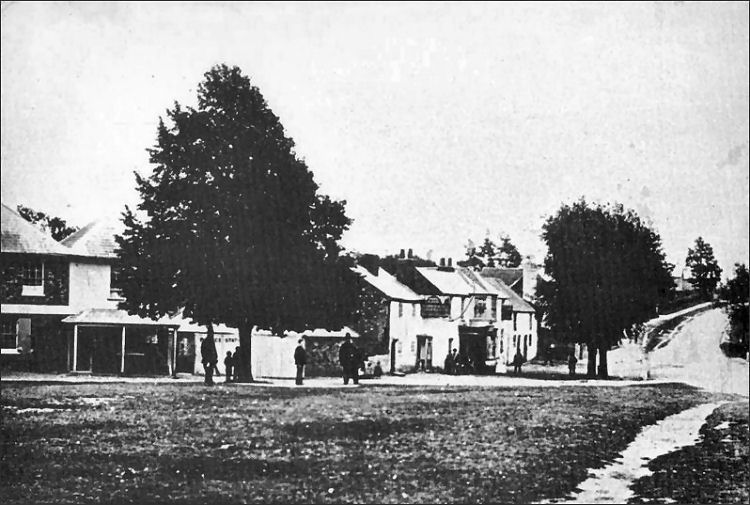
Above photo 1865. |
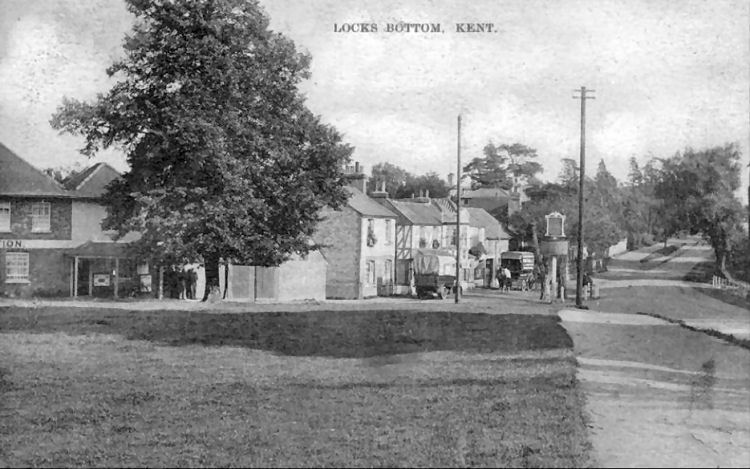
Above postcard, date unknown. |
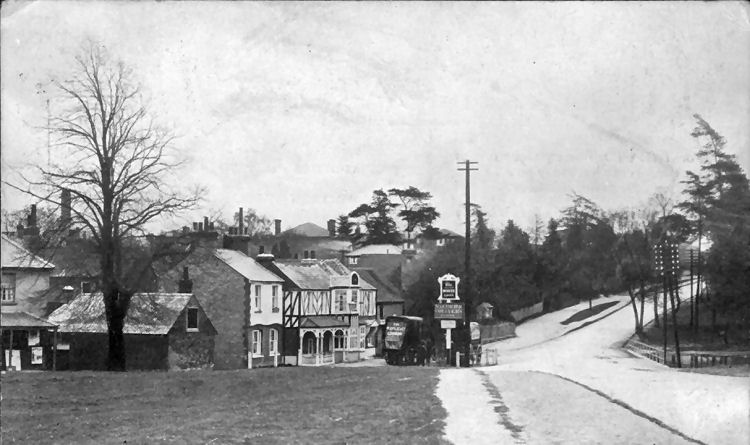
Above postcard, 1905.
|
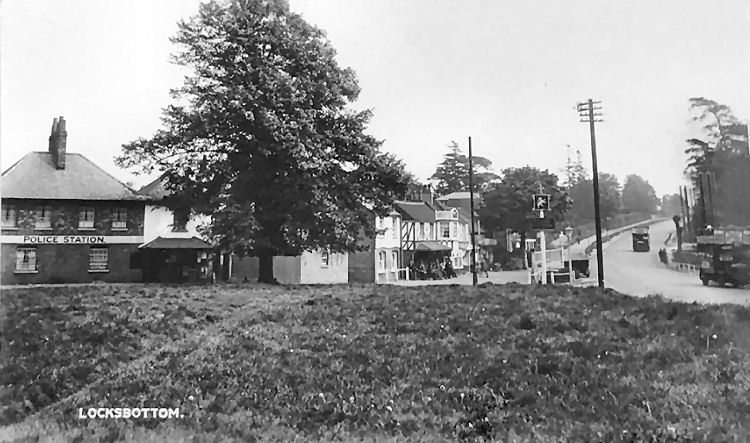
Above postcard, circa 1911, kindly sent by Rory Kehoe. |
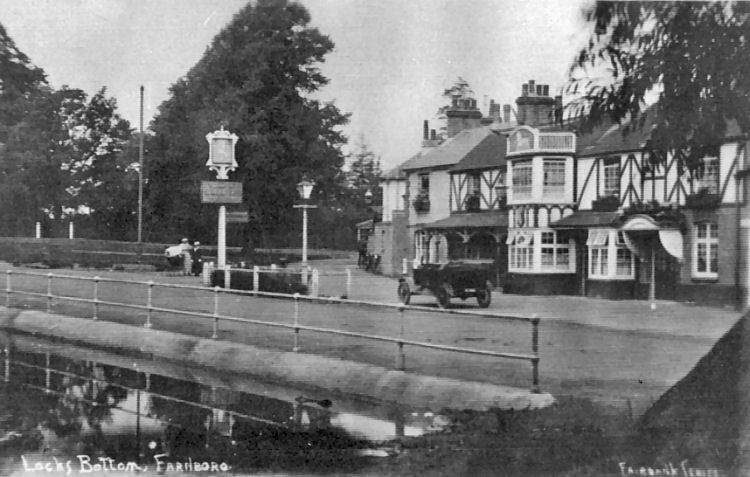
Above postcard, date unknown. The spelling was given as "Whyte Lion" on
the postcard. |
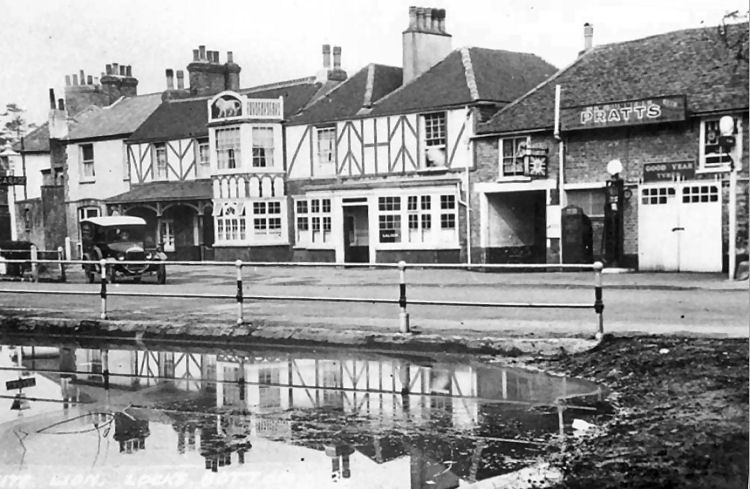
Above photo, circa 1921. |
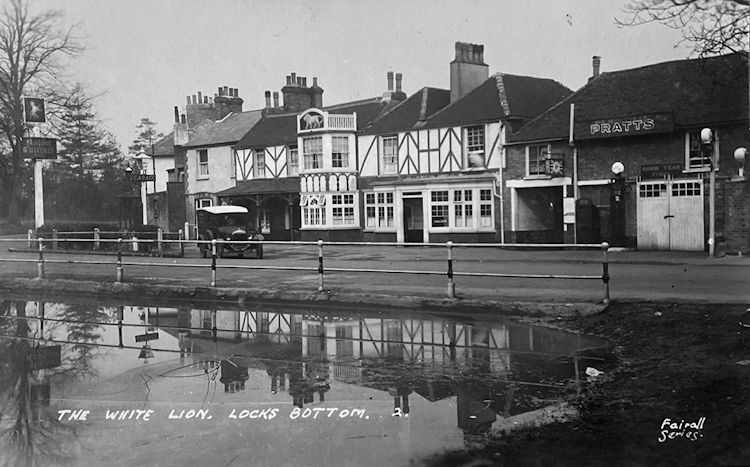
Above postcard, circa 1921, kindly sent by Rory Kehoe. By the time this
photograph was taken, it looks as though the pub had converted its
former stables into a filling station. It was quite common, one hundred
years, for inns and hotels to offer their customers petrol, as well as
the usual range of refreshments. |
|
From the Kentish Gazette, 11 September 1810.
KENT.
TO BREWERS, DISTILLERS, INNKEEPERS, AND OTHERS.
Two capital INNS, one PUBLIC HOUSE, four other HOUSES, and several
parcels of extremely valuable LAND, in the parishes of Farnborough,
Otford, Sevenoaks, Sundrish, and Chevening.
THE WHOLE FREEHOLD. TO BE SOLD BY AUCTION. By G. HOOPER, AT the
"WHITE HART INN," Riverhead, in the parish of Sevenoaks, on Monday,
the 24th day of September, 1810, at one o’clock, (subject to such
conditions of sale as shall be then and there produced;) the
following Very desirable FREFHOLD ESTATES, in Thirteen LOTS.
Lot 1. An excellent and well-accustomed INN, called by the name or
sign of the "White Lion," with suitable stables and other buildings,
and a large garden adjoining.
The whole premises contain two roods, thirty two perches, little
more or less, are now occupied by Mr. James Fuzzey, and situate at
Lock’s Bottom, in the parish of Farnborough, thirteen miles from
London, and contiguous to the Turnpike Road, leading from thence to
Tonbridge Wells and Hastings.
Lot 2. Two parcels of rich MEADOW LAND, one whereof contains one
acre, one rood, thirty-right perches, and the other two roods,
twenty-eight perches, little more or less, situate at Lock’s Bottom
aforesaid, adjoining lot 1, and in the occupation of the said James
Fuzzey.
Lot 3. A very valuable parcel of WOOD LAND, called Goddendean Wood,
plentifully stocked with thriving Oaks, containing thirteen acres,
one rood, thirty-eight perches, little more or less; also situate at
Lock's Bottom, adjoining the two last-mentioned lots, and in the
occupation of the said Janes Fuzzey.
This spot, being healthy, pleasant, and within a short ride of
London, affords a beautiful situation for building a villa.
Lot 4. A very valuable parcel of LAND, in four incisures, two
whereof are meadow, one small shaw, and the rest arable, containing
in the whole nine acres, three roods, five perches, little more or
less, situate adjoining the London road, near Longford Mill, in the
parish of Otford, and in the occupation of James Foot.
Lot 6. A MESSUAGE or TENEMENT, and GARDEN, also adjoining the London
road, situate in Riverhead, in the parish of Sevenoaks, in the
occupation of Mr. N. M. Jackson.
Lot 6. Five several inclosures of valuable LAND, whereof one is
pasture, two are meadow, and two arable, containing together
fourteen acres, one rood, four perches, little more or less, situate
near Sundrish Mills, in the parish of Sundrish, in the occupation of
Mr. James Foot.
The river Darenth intersecting these premises, affords good fishing,
and a constant opportunity of flowing the land.
Lot 7. Part of two inclosures of excellent MEADOW LAND, called the
Great Marsh and the Slip, as the same are now stumped out,
containing together three acres, one rood, nine perches, little more
or less; situate at Sundrish aforesaid, adjoining to the Turnpike
Road, and divided from lot 6, by the river Darenth; also in the
occupation of Mr. James Foot.
Lot 8. A parcel of excellent MEADOW LAND, called the Little Marsh,
part of the Great Marsh meadow and of the Landway, as the same are
now stumped out, containing together two acres, two roods, ten
perches, little more or less; situate, at Sundrish aforesaid
adjoining to lot 7, and in the occupation of the said James Foot.
Lot 9. A very excellent, substantial, and well-accustomed PUBLIC
HOUSE, called by the name or sign of the "Lamb," with good stables,
and other convenient buildings, remarkably well situated for trade,
in the pleasant village of Sundrish, adjoining the Turnpike Road
leading from Riverhead to Westerham; good garden and orchard, well
planted with thriving fruit trees, together with a parcel of capital
MEADOW LAND, all contiguous, and containing two acres, one rood,
thirty-nine perches, little more or less, in the occupation of Mr.
James Jones.
Lot 10. A very valuable piece of MEADOW LAND, called the Lamb Mead,
containing one acre, one rood, twenty-two perches, lying immediately
opposite to lot 9, bounded on the south by the river Darenth, close
to the Turnpike Road, and in the occupation of the said James Jones.
Lot 11. A COTTAGE and excellent GARDEN, very pleasantly situated at
Sundrish Cross, in the village of Sundrish, also adjoining the
Darenth, containing nearly a quarter of an acre, in the occupation
of Henry Gander.
Lot 12. Two MESSUAGES, TENEMENTS, or COTTAGES, with a small piece of
Ground adjoining, situate in Chipstead-street, in the parish of
Chevening, in the several occupations of Thomas Barham and Thomas
Harris.
Lot 13. A very capital FREEHOLD ESTATE, being a well established INN
and POSTING-HOUSE, called the "White Hart," with spacious and
commodious stables recently erected, and other buildings and
accommodations, well calculated for the purpose of an Innkeeper.
These premises are most advantageously situated at Riverhead,
twenty-two miles from London, on the much frequented road leading
from thence to Tonbridge Wells and Hastings, in the occupation of
Mr. James Foot.
The above Estates may be viewed by leave of the respective tenants,
and the purchasers will be entitled to possession at Michaelmas
next.
Further particulars may be had of the Auctioneer, or of Mr. Crow,
Solicitor, Sevenoaks, at whose Office plans of lots 1, 2, 3, 4, 6,
7, 8, 9, and 10, may be seen.
|
|
From the Kentish Gazette, 19 March 1844.
White Lion Inn, Locks Bottom, near Farnborough, Kent.
MR W. FIELD will SELL BY AUCTION, on the Premises, on FRIDAY, March 12,
at 11 for 12, by order of the Proprietor, on account of the lease
expiring, the HOUSEHOLD FURNITURE and Effects; comprising four-post,
French, and other bedsteads und furnitures, excellent feather beds and
bedding, double and single chests of drawers, Chamber’s portable water
closet, dressing glasses, tables, chairs, wash hand stands, mahogany
dining Pembroke and other tables, bookcase, sets of mahogany chairs,
sofas, chimney and pier glasses, carpets, window curtains, eight-day
dial, ditto clock, china, glass, dessert und dinner services, kitchen
requisites, a mangle, garden rollers, chaff-cutting machines, a fine
milch cow in calf, dairy utensils, poultry, and various effects. May be
viewed one day prior, when Catalogues may be had on the Premises and of
the Auctioneer, corner of Osnaburgh-Place, New Road, Marylebone.
|
|
Maidstone Journal and Kentish Advertiser, Tuesday 13 March 1849.
Inn and Posting House To Let.
The "White Lion," at Locksbottom, Farnborough Kent, 13 miles on the
Sevenoaks, Tonbridge and Hastings Road, with possession at Ladyday,
consisting of the Inn, with yard. stabling, and coach-houses, together
with the Tap, about 2 acres of meadow land, and good garden.
For further particulars and to treat for the same apply to Mr. William
Stow, Land Agent, Farnborough, near Bromley, Kent.
|
|
Maidstone Journal and Kentish Advertiser, Saturday 26 June 1869.
Extraordinary charge of assault.
William Whitehead, Arthur Whitehead, and Charles Edmunds, was severely
charged with assaulting William Wilson, on Sunday
evening, 20th June, and also with damaging his coat.
Mr. Alsop appeared for the defendants.
Prosecutor stated he was a bricklayer, residing at Masons Hill, Bromley.
On Sunday evening, at 10 o'clock, he was at the "White
Lion," Locksbottom, and met with defendants, and they had a dispute
about some donkeys. He afterwards left them to go home.
On arriving at the "Plough Tavern," Bromley Common, he and his two
friends went in and asked for some whisky, but as it was
past 11 they were not served. His friends went on ahead, and he followed
them. Shortly after William Whitehead overtook him,
then turned around and whistled, and instantly "let drive at him"
cutting his lip. The other defendants then came up, with several
others not known, and they all pitched into him, tearing his coat
completely in two.
Mr. Alsop cross-examined the complainant, setting up a defence that he
had thrown a large flint stone at William Whitehead, and
that he also took out a knife with the intention of stabbing him, at the
same time cutting his thumb.
Prosecuted denied the statement, and called as a witness, Charles
Julian, who said he resided at Bromley, and was in company
with his friend Wilson on the evening in question, and he could
positively swear that his friend neither threw a stone nor had a
knife with him. Witness also prove the assault as stated by prosecutor.
Joseph Whitmore, also residing at Bromley, who was present at the
assault, identified William Whitehead as the first man who
struck Wilson, and also identified the other two defendants as coming up
after William Whitehead had whistled, both of them
likewise striking the complainant. Complainants neither threw a stone or
had a knife in his possession.
Mr. Alsop, on behalf of defendant, stated that on the previous evening,
about 11:30, a great commotion was heard among some
ducks in a pond belonging to Mr. Woodnough, proprietor of the "Plough
Tavern." Mr. Woolnough jun., ran out and found the
complainant Wilson lying down near the pond, and at the same time he saw
a dog belonging to the complainant come out of the
pond. He asked complainant what his intention was, and he instantly got
up and walked away. Mr. Woolnough believing it was the
intention of the complainant to steal his father's ducks called for
assistance, and the defendant's instantly gave chase, and overtook
complainant and his friends, which caused the disturbance in question.
Police constable J. Sims 23P, stated he was on duty at Bromley Common on
the night in question, and heard a great disturbance. He went to the place where the row was and saw the defendant and
complainant fighting. Defendant wanted to give plaintiff into
custody for attempting to steal some ducks, but he used his own
discretion and took defendants into custody for assaulting the
complainant.
P.C. 376P., corroborated the last witness's statement, and said that he
saw W. Whitehead on the top of the complainant, striking
him, and the other defending, Arthur Whitehead, also came up and struck
him while he was on the ground.
Mr. Walnut Woolnough was called for the defence, and stated that on the
Sunday evening his uncle came in and said there was a
dog in the pond after the ducks. He went out and saw the complainant
lying down by the palings, about 5 yards from the pond. He
asked complainant what he was doing, and he instantly jumped up and ran
across the road. He called to the defendants, who at
once gave chase, and that was the cause of the disturbance.
The court was then cleared, and on being reopened the chairman said the
defendants stood convicted of assaulting a stranger from
a distant County, who was in Bromley holding a respectable position; and
it was fortunate for them that they had not individually
accused the complainants of using a knife, for there was not the least
evidence to prove such an accusation. William Whitehead
would have to pay a fine of £1, 3 s. 4d. damages, and 3s. 2d. costs.
Arthur Whitehead the same, and Edmunds, who was also
present at the assault, 10s., with damages and costs.
|
|
From Maidstone and Kentish Journal, 24th January 1895.
SAD DEATH AT BECKENHAM.
On Friday afternoon, Mr Carter held an inquest at the "White Lion,"
Locksbottom, as to the death of a man named William Wood, who had died
in the workhouse on Wednesday. Henry Wood, residing in a street of Clare
Market, said the deceased, who was a blacksmith and Bell hanger, was 55
years of age. He lived at the "Foresters Arms," High Street, Beckenham;
he has lived there for over 20 years. He last saw the deceased about a
fortnight before Christmas; he was then in his usual health.
PC Wright, 247P, stationed at Beckenham, said at 9:45 a.m. on the 14th
inst, he saw the deceased leaning against a fence in High Street,
Beckenham. He went to him, and noticed that he was ill asked what was
the matter. He said he had lost the use of his legs. Witnessed fetched
the ambulance, and Dr. Stillwell, the divisional surgeon, was called. He
ordered his removal to the workhouse infirmary, and this witness took
him there in a cab at once. Deceased rambled that little but said he had
been in a lodging house in Aspley Road, Penge. Deceased said he had
pains in his legs, and said he was not in want of food. He said he had
two brothers, but gave addresses which were empty houses. Witness had
known the deceased 6 or 7 years.
By a Juryman:- Deceased did not complain of having been ill treated.
Daniel Dinan, gate-porter at the Union Workhouse, said when the deceased
was brought to the house by the last witness, at 11:40 a.m., he seemed
to be rambling, and gave the name of a son Robert, at Cooper Lane,
Hannington, Norfolk, but the address was wrong. Elizabeth Amelia Green,
day nurse at the Union Workhouse (male ward), said the deceased was
brought to the ward at 11:55 a.m. on the 14th inst. He appeared
unconscious, and never rallied. He died at 8:30 a.m. on Wednesday. Dr
Alexander Shannon, medical officer at the workhouse, said he saw the
deceased at 10 a.m. on Monday. He was then in a deplorable half
delirious condition. He was very dirty, his body was not emancipated. He
rallied for a short time, but inflammation of the lungs came on, and he
gradually succumbed. He said he had undergone much hardship, and his
neglected condition bore that out. The corpes bore no marks and
violence, but was covered with vermin bites. The internal organs, with
the exception of the lungs, were healthy. They were old pleuritic
adhesions, and considerable pneumonia of two of the three days
duration; it had been coming on on the day he was admitted to the
infirmary. He attributed death to exhaustion and inflammation of the
lungs, occurring in an enfeebled condition. Pneumonia would arise from
self neglect and exposure. The inability to move his legs would arise
from rheumatism.
In answer to the coroner, the officer said that he had made enquiry at
Clark Market, and at the beer house where the deceased lodged, and
learns that he had been wandering about for 20 years.
Mr Gregory, master of the workhouse, said when the deceased was admitted
he had two shillings 2d on his person. He was unconscious, and gave an
address of a son at Norfolk, but a letter sent there had been returned
to the Dead Letter Office.
The jury found verdict in accordance with the medical testimony.
|
As the information is found or sent to me, including photographs, it will
be shown here.
Thanks for your co-operation. Every email is answered and all information
referenced to the supplier.
This page will be updated as soon as further information is found.
LICENSEE LIST
|






